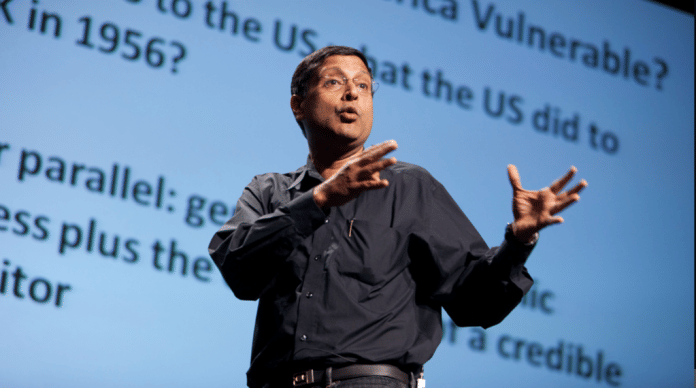He elevated the quality of the analysis and the presentation of ideas for public deliberation in his four ‘Economic Surveys’, says finance minister Jaitley.
Few days ago chief economic adviser Arvind Subramanian met me over video conferencing. He informed me that he would like to go back to the United States on account of pressing family commitments. His reasons were personal but extremely important for him. He left me with no option but to agree with him.
Arvind had joined us as the chief economic adviser on 16 October, 2014 for a period of three years. On the expiry of the three years, I had requested him to continue for some more time. Even at that stage he told me that he was torn between family commitment and his current job which he considered the best and most fulfilling he has ever done.
Arvind’s interaction with the Government in the Ministry of Finance, Prime Minister’s Office and with other Departments was both formal and informal. His instantaneous communications with his interlocutors had increased his effectiveness. The Chief Economic Advisor’s job had multi-facets to it. He is not a spokesman of the Government. He is an Advisor who has to analyse and thinks several steps ahead. It is a unique responsibility with freedom to the work that he enjoys. Arvind functioned within these parameters and concentrated on the challenges to the economy. His early diagnosis of the twin balance-sheet had led us to adopt the macro-economic strategy of higher public investment in the Budget of 2015-16. He conceptualised JAM (Jan Dhan, Aadhar, Mobile) as a data base for availing public benefits. He contributed to the debate of federalism by conceptualising that the Indian federalism has not merely to be cooperative but also competitive. He came out with newer ideas, policy reforms in the sectors of clothing, fertilizers, kerosene, power and pulses. His report on the Revenue Neutral Rate was of great use in forging a consensus which led to the constitution amendment enabling the GST. He participated in every meeting of GST, gave his independent views and was heard in rapt attention by almost every Finance Minister.
He elevated the quality of the analysis and the presentation of ideas for public deliberation in his four “Economic Surveys”. His documents for four years was treated by several independent critics as one of the best ever produced. The latest survey had about 15 million visitors from 117 countries. The Economic Survey today is a basic teaching material all over India. He thought ahead and, therefore, came out with futuristic ideas on rationalisation of removal of “subsidies for the rich”, universal basic income, climate change, from “socialism without entry and capitalism without exit” and the four C’s that he had historically paralysed decision making. He conducted the first online course on Indian economy for the benefits of students and teachers across the country. He launched the Government’s online education platform “Swayam”, which became one of the most followed courses in India. He travelled across the country and spoke on public platforms on economic issues to elevate the quality of public discourse. He built up a strong team of both “insiders” and “outsiders” in the Economic Division of the Ministry.
Personally I will miss his dynamism, energy, intellectual ability and ideas. He would walk into my room – at times several times a day, addressing me as “Minister” to give either the good news or otherwise. Needless to say his departure will be missed by me. But I know that his heart is very much here. I am sure he will keep sending advice and analysis wherever he is.
I wish Arvind Subramanian and his family all the very best.
Thank you Arvind.






